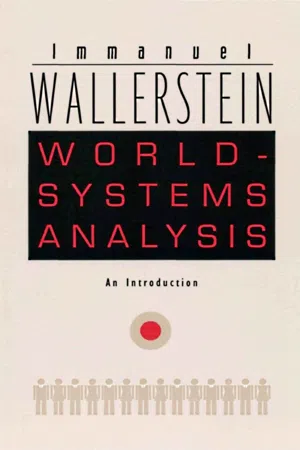
- English
- PDF
- Available on iOS & Android
About this book
Wallerstein explains the defining characteristics of world-systems analysis: its emphasis on world-systems rather than nation-states, on the need to consider historical processes as they unfold over long periods of time, and on combining within a single analytical framework bodies of knowledge usually viewed as distinct from one another—such as history, political science, economics, and sociology. He describes the world-system as a social reality comprised of interconnected nations, firms, households, classes, and identity groups of all kinds. He identifies and highlights the significance of the key moments in the evolution of the modern world-system: the development of a capitalist world-economy in the sixteenth-century, the beginning of two centuries of liberal centrism in the French Revolution of 1789, and the undermining of that centrism in the global revolts of 1968. Intended for general readers, students, and experienced practitioners alike, this book presents a complete overview of world-systems analysis by its original architect.
Tools to learn more effectively

Saving Books

Keyword Search

Annotating Text

Listen to it instead
Information
Table of contents
- Contents
- Acknowledgments
- To Start: Understanding the World in Which We Live
- 1. Historical Origins of World-Systems Analysis: From Social Science Disciplines to Historical Social Sciences
- 2. The Modern World-System as a Capitalist World-Economy: Production, Surplus-Value, and Polarization
- 3. The Rise of the States-System: Sovereign Nation-States, Colonies, and the Interstate System
- 4. The Creation of a Geoculture: Ideologies, Social Movements, Social Science
- 5. The Modern World-System in Crisis: Bifurcation, Chaos, and Choices
- Glossary
- Bibliographical Guide
- Index
Frequently asked questions
- Essential is ideal for learners and professionals who enjoy exploring a wide range of subjects. Access the Essential Library with 800,000+ trusted titles and best-sellers across business, personal growth, and the humanities. Includes unlimited reading time and Standard Read Aloud voice.
- Complete: Perfect for advanced learners and researchers needing full, unrestricted access. Unlock 1.4M+ books across hundreds of subjects, including academic and specialized titles. The Complete Plan also includes advanced features like Premium Read Aloud and Research Assistant.
Please note we cannot support devices running on iOS 13 and Android 7 or earlier. Learn more about using the app